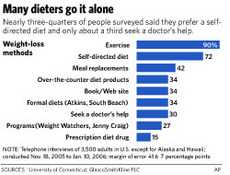Doctors say no proof that diet pills work

Joseph Lamberson
Nov 7, 2006
Last updated on May 12, 2016 at 06:05 a.m.
BOSTON – Besides extra pounds, dieters also seem to carry a hefty independent streak. A survey finds that 70 percent of Americans who are trying to lose weight are following their own diet plans and have no interest in seeking a doctor’s help.
One-third have tried dietary supplements of unproven benefit – pills and powders that promise to burn fat, boost metabolism or melt pounds without the sweaty hard work of exercise or the discipline and deprivation of diets, the survey found.
Doctors say there is no safe way to lose more than a pound or two a week and no proof that unregulated, over-the-counter products help.
“People need to get away from magical thinking,” said Saul Shiffman, a University of Pittsburgh health psychologist who helped develop the survey. “It’s easy to hope for a magic pill that’s going to rev up their metabolism or shed their pounds.”
Get The Daily Illini in your inbox!
He and the others involved in the survey were paid by GlaxoSmithKline PLC, which has an obvious interest in steering people away from dietary supplements. The company makes orlistat, sold in prescription form as Xenical and soon to be available over the counter.
But despite the survey’s commercial ties, it still offers a realistic glimpse at some unrealistic dieting practices and highlights missed opportunities for doctors to help, said weight-loss specialists who attended a recent obesity conference in Boston, where the survey was presented.
“Everybody can lose weight,” said Dr. George Blackburn, a Harvard Medical School nutrition expert familiar with the survey who also has consulted for Glaxo. If people failed in the past, “they didn’t try long enough and effectively enough,” he said.
Weight-loss products form an enormous industry, gobbling up a billion dollars a year, the Federal Trade Commission estimates. Nearly 15 percent of U.S. households bought such products at least once last year, according to ACNielsen, a marketing information firm.
Sales of two popular categories, over-the-counter appetite suppressants and diet-related meal replacements like shakes and bars, amounted to $322 million in 2005.
Consumers also spent $244 million on prescription weight-loss drugs last year, reports IMS Health, another healthcare information firm.
The survey was done by the University of Connecticut through random phone calls to 3,500 adults nationwide from Nov. 18, 2005, to Jan 10, 2006.
Of the 1,444 people who said they had made a serious weight-loss attempt for at least three days, thirty-four percent used supplements and 15 percent used prescription drugs. Federal guidelines say that drugs are appropriate for people who have unsuccessfully tried to lose at least 10 percent of their body weight through diet and exercise alone.
Supplement users tended to be female (45 percent vs. 20 percent of males), obese rather than just overweight, and more likely to have annual household incomes of less than $40,000.
Supplements often are used by low-income people “who can less afford to waste their money on products that don’t work,” Shiffman said.





